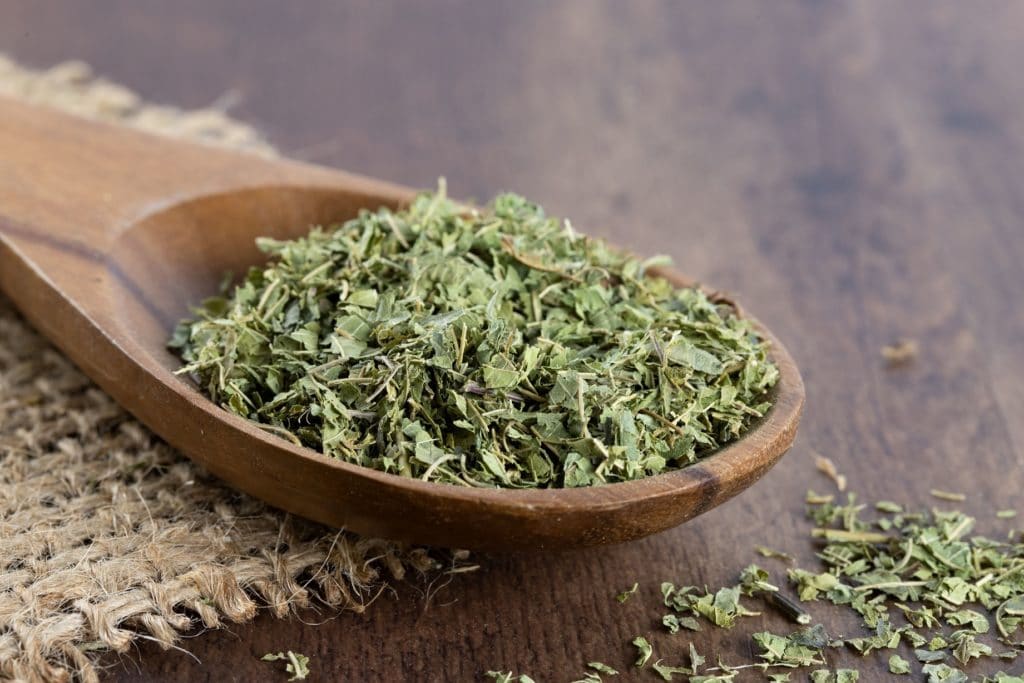Mint tea in pregnancy?

- Up to two cups of mint tea during pregnancy is not a Problem.
- Very much mint tea stimulates the metabolism and in extreme cases may cause even contractions and lead to Premature births and miscarriages.
- Do not drink mint tea if you suffer from heartburn.
- You can do without in pregnancy on of peppermint oil.
Table of contents
Increased Need
Being pregnant is not easy, for many reasons. One of them is: you have to drink more than usual, because the fluid transports the nutrients a Baby needs. The more liquid you take, the more blood you have the more water you put – and does the fetus. At the same time, you need to pay greater attention than usual to what you drink: alcohol is of course taboo, and caffeine only in small doses, but also some of the first healthy beverages can have in larger amounts of unintended consequences.

An All-Rounder
Peppermint tea is popular worldwide. No wonder: He helps against indigestion, flatulence and Gastritis. Peppermint helps in the gallbladder is tense, the tea stimulates the production of bile juices and ensures that these can flow. The same applies to the stomach, where it stimulates the Pouring out of gastric juice and helps to empty the stomach and stimulate appetite. In the intestine, it drives, bloating, and abdominal pain disappear, caused by flatulence.
He also helps against the symptoms of a flu and a cold. In the mouth and throat the tea fights germs and it is effective against cough as well as sore throat and frees the Airways. In short: mint tea is a home remedy against many ailments, which also can be purchase anywhere and also tastes very good.
Late Discovery
Peppermint is not a “natural” Plant, but a hybrid of brook mint and spearmint, the biologist John Ray in 1696, discovered in a garden. Today, there are countless forms that differ in appearance, potency and taste. Black Mint called dark green, White Mint light green variants.
Peppermint loves a temperate climate and wild here, in the South of Germany as in England. Breeding cultures, there are, among other things, on the Balkans, in Spain, to the North-East of the USA and in South America. In Germany, the cultivation centres are located in Munich, in Swiss francs; un upper Bavaria, upper Palatinate and Thuringia.
Application
The leaves of peppermint contain the essential peppermint oil and can therefore be used for tea and as a spice use, for example, for lamb dishes and Desserts. The older the leaves are, the more Menthol they contain. It is harvested once in the summer before flowering and once in the fall. Most of the leaves come dried in the trade, or be processed to peppermint oil.
As a medicinal plant, peppermint is very popular, the leaves have active ingredients in a low dose, in order to be considered as a regular medicinal product. This is the quality you get, if you have 1.2 per cent, or more of essential Oil. In addition to the Oil, the peppermint also contains tannins and flavonoids.

The Oil is used as a flavor carrier, and on the other it is inhaled for colds or infections on the skin removed. The Rubbing of the temples, helps against migraine and other headaches. In the case of the common cold, it is not a subjective effect, since the cooling is felt to be effect of the Patients as a pleasant, when you Swallow the mint helps. The active ingredients also have a soothing effect, so peppermint tea also helps in falling Asleep, against nervousness, States of anxiety and Stress.
Good for Pregnant women?
In small amounts, i.e. up to two cups a day, there is a risk of any negative effects of the teas for Pregnant women. The tea helps especially against the discomfort of the first Phase of pregnancy, particularly for Nausea and vomiting. Against not required by the pregnancy caused inconvenience to Pregnant women pepper can drink mint tea: flatulence, diarrhea, colds or sleep problems.
The dose makes it
The Menthol in the peppermint oil warms the body and stimulates the metabolism. As plants with similar effects – so, cardamom, cinnamon, cloves, ginger, Chili and Basil – it speeds up the contractions. In the worst case, the Uterus is stimulated so that it comes to a miscarriage.
Panic but misses. The Oil in the dried leaves in so small quantity, that in the case of a consumption of two cups of tea per day with no unwanted effects occur. All Pregnant women should avoid, however, peppermint oil. No peppermint tea should take if you suffer from heartburn because it stimulates the production of stomach acid.
Which combinations are suitable?
You should take during the pregnancy in any case of mint tea along with other products that stimulate the circulation. Anise stimulates the in large amounts of the uterus, in no case, you are allowed to use anise oil. The same applies for vervain, Angelica, and fennel. All of these herbs in small doses and as a kitchen spice for Pregnant women harmless.
If you are using the herbs, however, together, raised to the power of their effect on the Uterus: A small dose of peppermint plus a small dose of vervain and a small dose is already quite a large dose. So use all of these herbs sparingly.

A tip: If you drink a lot of peppermint tea and two cups per day is too little, then mix the mint tea with other teas that do a pregnant body good. Very good Rooibos tea. Firstly, it is mild and contains a second, much iron you need in pregnancy to an increased extent. Black tea they should not, however, like pure pepper to take mint tea only a small amount, since too much caffeine in pregnancy. The Mix of chamomile tea to prevent inflammation in addition.
For Schwangerschaftstees you can use peppermint and mix with lady’s mantle (regulates hormones, helps against Nausea), lemon balm (against tension and Stress), buckthorn, St. John’s wort, and Lemongrass. Calming lavender flowers.
Peppermint tea (cooled), is an excellent fit to banana milk and peach juice. Dried peppermint leaves you can mix in yogurt or a Smoothie with peppermint tea, carrots and lemon prepare.
And in the quiet time?
While you can take in pregnancy peppermint in moderation, you should avoid during the breastfeeding phase. Mint tea slows down the production of milk (tip: to increase this, you can use instead of fenugreek). In addition, the steam of mint tea can trigger the infant to allergic reactions and even lead to shortness of breath. (Dr. Utz Anhalt)




